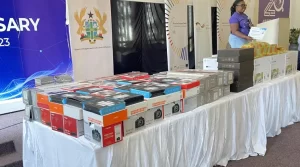By Juliet ETEFE
The Ghanaian-European Centre for Jobs, Migration and Development (GEC) of Deutsche Gesellschaft für Internationale Zusammenarbeit (GIZ) Ghana has provided skills training and start-up support for 40 young people.
The objective of the training is to scale up female participation in male-dominated sectors as well as train and set up returned migrants and vulnerable local populations in readily available demand-driven vocational trade areas.
As such, the participants consisting of 22 females and 18 males participated in a four-month targeted gender digital photography, videography, drone piloting and graphic design training.
This comes at a time when the African Development Bank estimates that close to 100 million youth will be without jobs in the next five to 15 years. If not addressed, youth unemployment and underemployment will significantly impact socioeconomic well-being on the continent.
Curbing unemployment
Through this training, the German Cooperation is supporting the Government of Ghana’s all-inclusive approach to decent jobs and curbing youth unemployment in the country.
In a speech at the closing ceremony held in Accra, the Head of the Ghanaian-European Centre, Andreas Berding, noted that in addition to the skills training, GEC is supporting the 40 beneficiaries to set up their businesses by providing startup equipment including laptops, printers, cameras, speedlights, memory cards, soft-box, and tripod stands.

“We at the GEC are delighted to support the Government of Ghana to tackle youth unemployment. With this training, we want to support young people to develop career perspectives in this fast-growing and demand-driven sector.
“Hereby, its special objective is to promote economic opportunities for women. In this context, the creation of opportunities for income and self-employment therefore is a key issue of economic and social empowerment,” he said.
He urged the participants to make good use of the skills acquired to make outstanding strides in their various areas.
“The benefits of a demand-driven vocational training such as this one that you have undertaken can be enormous. Not only in view to relevant skills that you may have learned but also to be able to become your own boss, to become self-reliant and to provide employment for other people too,” he pointed out to the participants.
He noted that: “With support from of the German Federal Ministry of Economic Cooperation and Development (BMZ) and the European Union, the Centre has in the last six years supported the creation of more than 18,000 jobs for both low-and-medium skilled returned migrants as well as unemployed local population.
“And we are looking forward to continuing our work with our partners through similar activities to provide economic opportunities and a livable future.”
Managing Partner at YAMES Contract Works, Charles Acquah-Moses further urged the participants to embrace continuous learning while commending facilitators for their efforts.
Technical Advisor and Gender Focal person at GEC, Marigold Gyamfi-Domfeh also highlighted her outfit’s effort to bridge gender gap through their programmes as well as impact lives one at a time.
Performance
Mr. Edwin Adjei Adjetey was named the Overall best student, with Jessica Naa Borley Borketey, Cecelia Arthur and Christabel Naa Ashorkor Amarh emerging as the best female photography students.
Also, Millicent Mensah Torkunoo, Isaac Annan and Angela Annor were the best graphic design students.
Impacts
Since its inception in 2017, GEC, in partnership with the Ministry of Employment and Labour Relations, has provided essential skills training in various technical and vocational areas and business start-up support to more than 11,000 people including returned migrants and Vulnerable groups including women and persons living with disabilities. The Centre has also mediated about 6836 persons into employment.
The GEC, which is an initiative of the German Federal Ministry of Economic Cooperation and Development (BMZ), is implemented by the Deutsche Gesellschaft für Internationale Zusammenarbeit (GIZ), and co-funded by the European Union.









